外研版英语中考语法专项——动词及短语动词 知识梳理+实战演练(含答案)
文档属性
| 名称 | 外研版英语中考语法专项——动词及短语动词 知识梳理+实战演练(含答案) | 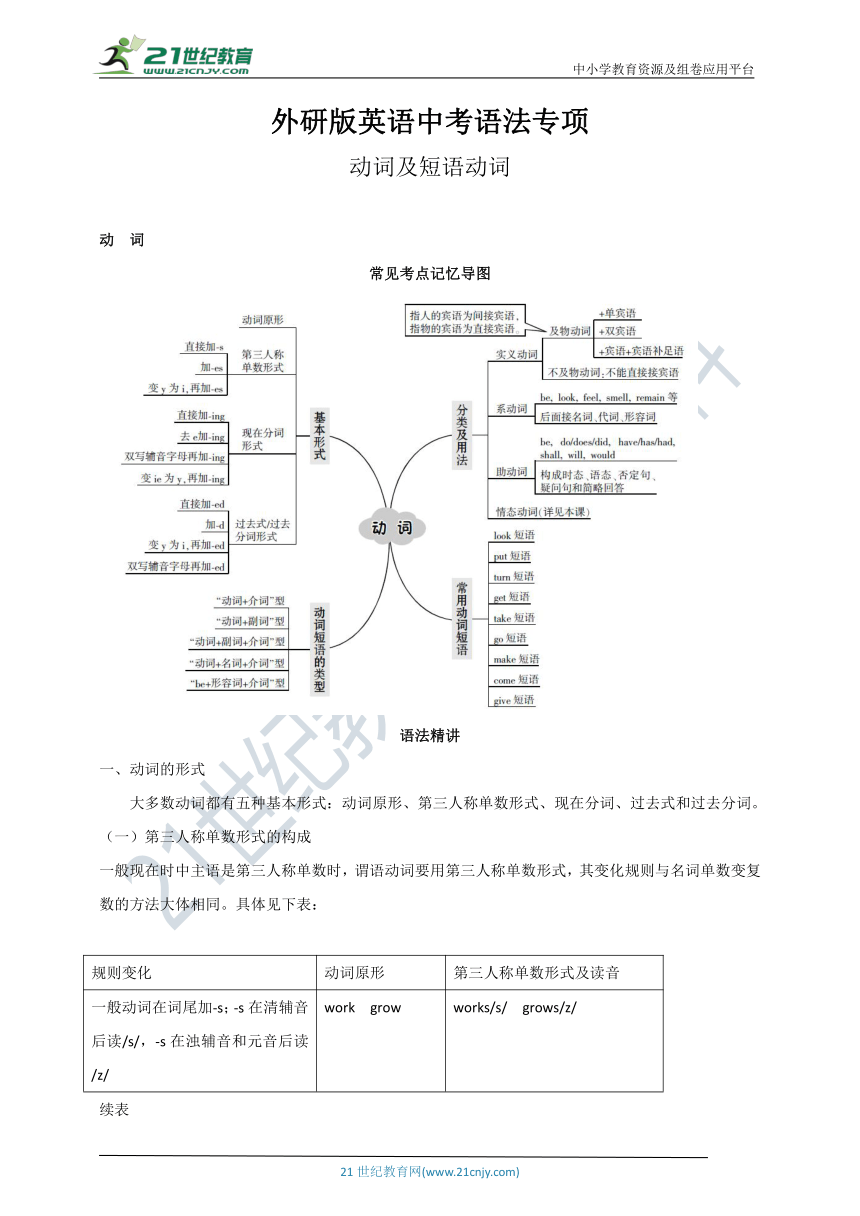 | |
| 格式 | doc | ||
| 文件大小 | 1.6MB | ||
| 资源类型 | 试卷 | ||
| 版本资源 | 外研版 | ||
| 科目 | 英语 | ||
| 更新时间 | 2022-02-08 21:04:37 | ||
图片预览

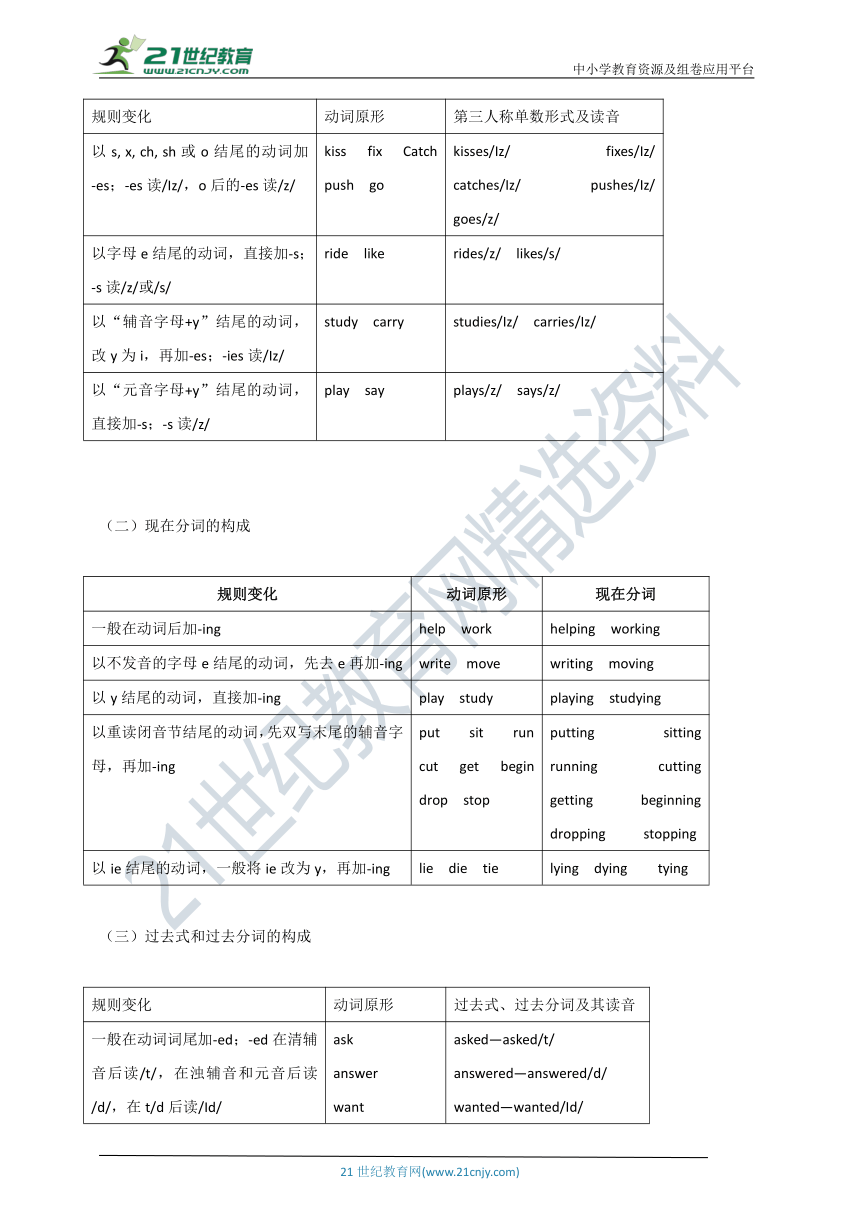
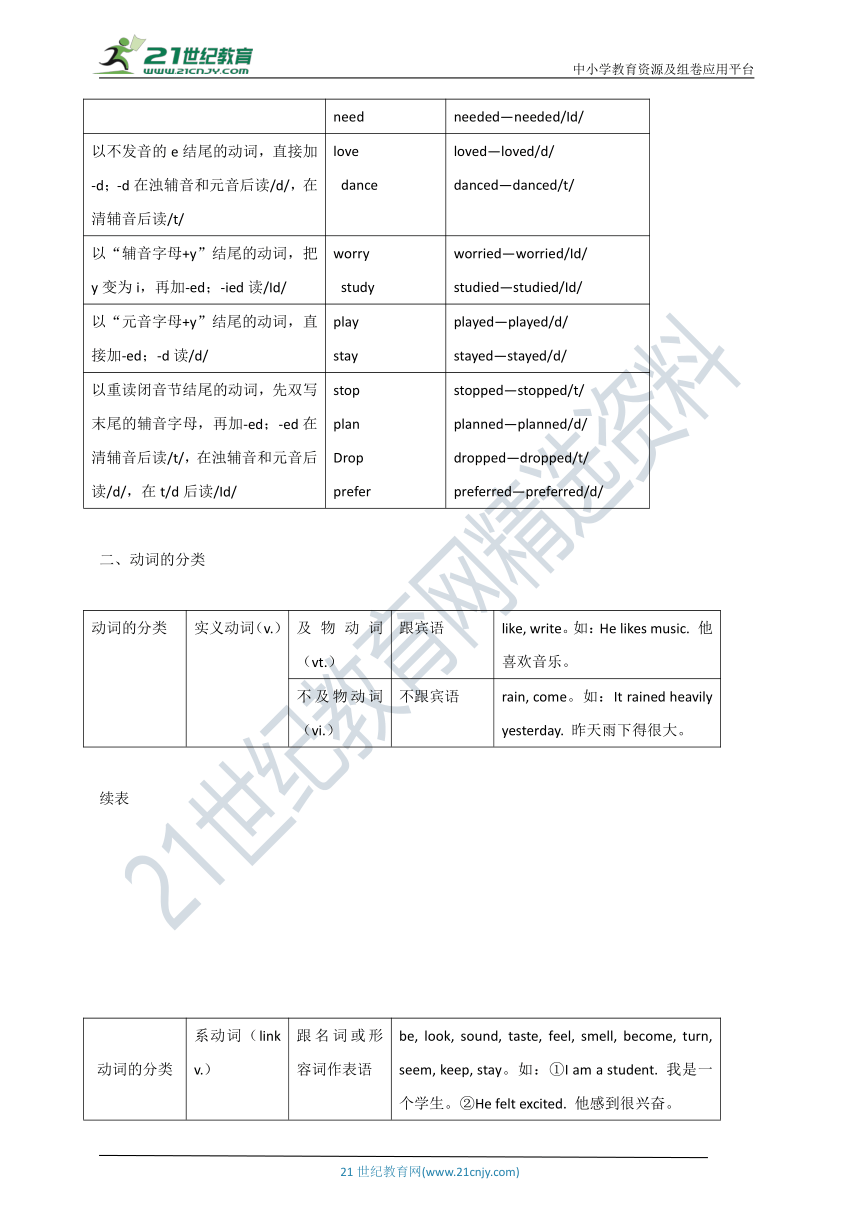
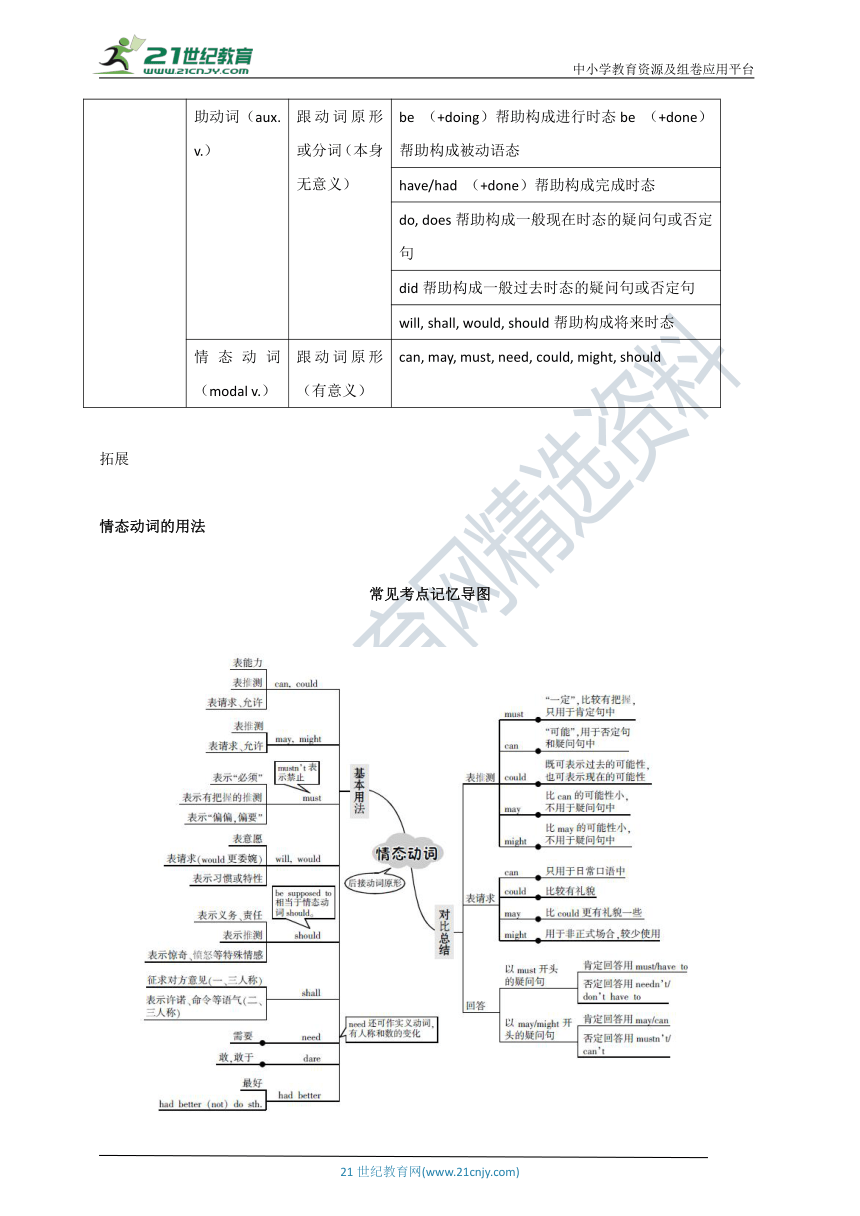
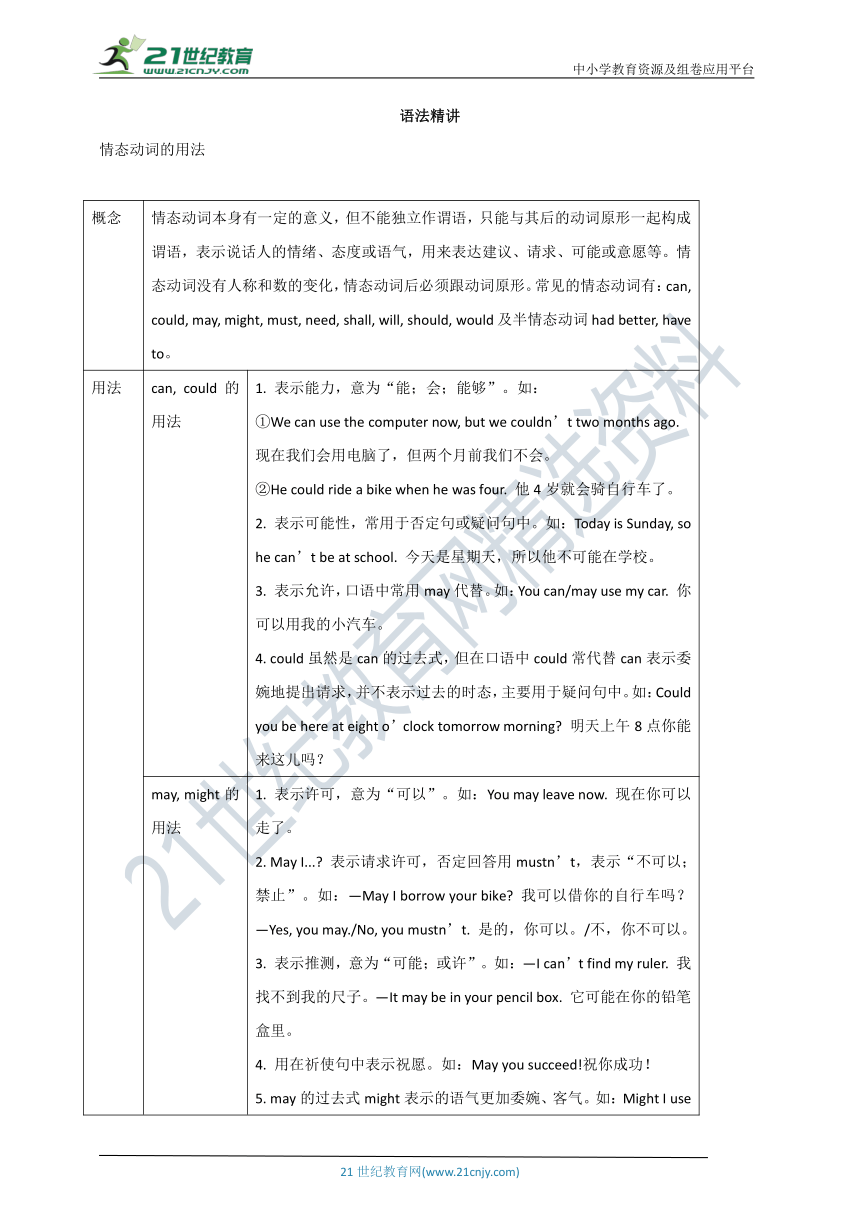
文档简介
中小学教育资源及组卷应用平台
外研版英语中考语法专项
动词及短语动词
动 词
常见考点记忆导图
语法精讲
一、动词的形式
大多数动词都有五种基本形式:动词原形、第三人称单数形式、现在分词、过去式和过去分词。
(一)第三人称单数形式的构成
一般现在时中主语是第三人称单数时,谓语动词要用第三人称单数形式,其变化规则与名词单数变复数的方法大体相同。具体见下表:
规则变化 动词原形 第三人称单数形式及读音
一般动词在词尾加-s;-s在清辅音后读/s/,-s在浊辅音和元音后读/z/ work grow works/s/ grows/z/
续表
规则变化 动词原形 第三人称单数形式及读音
以s, x, ch, sh或o结尾的动词加-es;-es读/Iz/,o后的-es读/z/ kiss fix Catch push go kisses/Iz/ fixes/Iz/ catches/Iz/ pushes/Iz/ goes/z/
以字母e结尾的动词,直接加-s;-s读/z/或/s/ ride like rides/z/ likes/s/
以“辅音字母+y”结尾的动词,改y为i,再加-es;-ies读/Iz/ study carry studies/Iz/ carries/Iz/
以“元音字母+y”结尾的动词,直接加-s;-s读/z/ play say plays/z/ says/z/
(二)现在分词的构成
规则变化 动词原形 现在分词
一般在动词后加-ing help work helping working
以不发音的字母e结尾的动词,先去e再加-ing write move writing moving
以y结尾的动词,直接加-ing play study playing studying
以重读闭音节结尾的动词,先双写末尾的辅音字母,再加-ing put sit run cut get begin drop stop putting sitting running cutting getting beginning dropping stopping
以ie结尾的动词,一般将ie改为y,再加-ing lie die tie lying dying tying
(三)过去式和过去分词的构成
规则变化 动词原形 过去式、过去分词及其读音
一般在动词词尾加-ed;-ed在清辅音后读/t/,在浊辅音和元音后读/d/,在t/d后读/Id/ ask answer want need asked—asked/t/ answered—answered/d/ wanted—wanted/Id/ needed—needed/Id/
以不发音的e结尾的动词,直接加-d;-d在浊辅音和元音后读/d/,在清辅音后读/t/ love dance loved—loved/d/ danced—danced/t/
以“辅音字母+y”结尾的动词,把y变为i,再加-ed;-ied读/Id/ worry study worried—worried/Id/ studied—studied/Id/
以“元音字母+y”结尾的动词,直接加-ed;-d读/d/ play stay played—played/d/ stayed—stayed/d/
以重读闭音节结尾的动词,先双写末尾的辅音字母,再加-ed;-ed在清辅音后读/t/,在浊辅音和元音后读/d/,在t/d后读/Id/ stop plan Drop prefer stopped—stopped/t/ planned—planned/d/ dropped—dropped/t/ preferred—preferred/d/
二、动词的分类
动词的分类 实义动词(v.) 及物动词(vt.) 跟宾语 like, write。如:He likes music. 他喜欢音乐。
不及物动词(vi.) 不跟宾语 rain, come。如:It rained heavily yesterday. 昨天雨下得很大。
续表
动词的分类 系动词(link v.) 跟名词或形容词作表语 be, look, sound, taste, feel, smell, become, turn, seem, keep, stay。如:①I am a student. 我是一个学生。②He felt excited. 他感到很兴奋。
助动词(aux. v.) 跟动词原形或分词(本身无意义) be (+doing)帮助构成进行时态be (+done)帮助构成被动语态
have/had (+done)帮助构成完成时态
do, does帮助构成一般现在时态的疑问句或否定句
did帮助构成一般过去时态的疑问句或否定句
will, shall, would, should帮助构成将来时态
情态动词(modal v.) 跟动词原形(有意义) can, may, must, need, could, might, should
拓展
情态动词的用法
常见考点记忆导图
语法精讲
情态动词的用法
概念 情态动词本身有一定的意义,但不能独立作谓语,只能与其后的动词原形一起构成谓语,表示说话人的情绪、态度或语气,用来表达建议、请求、可能或意愿等。情态动词没有人称和数的变化,情态动词后必须跟动词原形。常见的情态动词有:can, could, may, might, must, need, shall, will, should, would及半情态动词had better, have to。
用法 can, could的用法 1. 表示能力,意为“能;会;能够”。如:①We can use the computer now, but we couldn’t two months ago. 现在我们会用电脑了,但两个月前我们不会。②He could ride a bike when he was four. 他4岁就会骑自行车了。2. 表示可能性,常用于否定句或疑问句中。如:Today is Sunday, so he can’t be at school. 今天是星期天,所以他不可能在学校。3. 表示允许,口语中常用may代替。如:You can/may use my car. 你可以用我的小汽车。4. could虽然是can的过去式,但在口语中could常代替can表示委婉地提出请求,并不表示过去的时态,主要用于疑问句中。如:Could you be here at eight o’clock tomorrow morning 明天上午8点你能来这儿吗?
may, might的用法 1. 表示许可,意为“可以”。如:You may leave now. 现在你可以走了。2. May I... 表示请求许可,否定回答用mustn’t,表示“不可以;禁止”。如:—May I borrow your bike 我可以借你的自行车吗?—Yes, you may./No, you mustn’t. 是的,你可以。/不,你不可以。3. 表示推测,意为“可能;或许”。如:—I can’t find my ruler. 我找不到我的尺子。—It may be in your pencil box. 它可能在你的铅笔盒里。4. 用在祈使句中表示祝愿。如:May you succeed!祝你成功!5. may的过去式might表示的语气更加委婉、客气。如:Might I use your pen for a while 我可以用一会儿你的钢笔吗?
must的用法 1. must作“必须;应该”讲时,表示必要性;mustn’t则表示“不应该;不许”。如:①You must buy a ticket. 你必须买票。②You mustn’t play on the road. 你不许在马路上玩。2. must作“一定”讲时,表示肯定的猜测(否定猜测用can’t,意为“不可能”)。如:①These must be Lucy’s clothes. 这些一定是露西的衣服。(对现在情况的推测)②Tom must be watching TV at home. 汤姆一定是在家看电视。(对现在正在发生的事情的推测)③She must have seen the movie. 她一定看过这部电影。(对过去情况的推测)注:回答Must... 引出的疑问句时,肯定回答用must,否定回答不能用mustn’t,而要用needn’t或don’t have to。如:—Must you finish your homework today 你今天必须完成作业吗?—Yes, I must./No, I needn’t. 是的,我必须。/不,我不必。
need的用法 need作情态动词,意为“需要”,主要用于一般疑问句和否定句,其肯定回答用must,否定回答用needn’t。如:—Need I finish the work today 我需要今天完成这项工作吗?—Yes, you must./No, you needn’t. 是的,你必须完成。/不,你不必。拓展:need作及物动词,其后的宾语可以是名词、动词不定式、动名词、代词。用法与其他行为动词一样,有人称和数的变化。如:—Does he need to wash his hands 他需要洗手吗?—Yes, he does./No, he doesn’t. 是的,他需要。/不,他不需要。
shall, should的用法 1. shall作情态动词,常用于一般疑问句,与第一人称连用,表示征求意见或看法。如:Shall we meet atthe school gate tomorrow morning 明天早上我们在学校门口见面好吗?2. should作情态动词,表示劝告或建议,意为“应该”,表示必要性。不可看作shall的过去式。如:We should be strict in all our work. 我们应该严格要求我们所有的工作。
will, would的用法 1. 表示必然性。如:Fish will die without water. 没有了水,鱼就会死去。2. 表达意愿或意志。如:①We’ll help him if he asks us for help. 如果他向我们寻求帮助,我们会帮他。②I promise that I would do my best. 我答应你,我会尽全力。3. 询问对方的意愿或提出请求,常与like, love连用,主要用于疑问句中。如:①Would you like another cup of coffee 你想再喝一杯咖啡吗?②Will you go with me 你愿意和我一起去吗?
三、短语动词
概念 动词跟一个或两个介词或副词构成固定词组后,在意义上和原来的动词不同,这种动词词组叫短语动词。
分类 动词+介词(后需加宾语) 1. allow for顾及 2. care for照顾 3. catch at尽力抓住4. come across偶然遇到 5. deal with处理 6. believe in相信7. depend on/upon依靠 8. get through度过 9. look for寻找10. laugh at嘲笑 11. send for派人去请 12. want for缺乏
动词+副词 及物动词+副词(后需加宾语,宾语为代词时放中间) 1. carry out执行 2. find out查明 3. give up放弃4. hand in上交 5. look up查找 6. pick up捡起7. put on穿上 8. put off推迟 9. ring up给……打电话10. set up建立 11. take off脱下 12. turn off关掉13. turn on打开 14. think over考虑
不及物短语动词(后不加宾语) get up起床 2. give in屈服 3. go on继续4. grow up成长 5. look out小心 6. show off炫耀7. set off/out出发 8. stand up起立 9. take off起飞 10. wake up醒来
动词+副词+介词(后需加宾语) 1. get on/along with... 与……相处 2. catch up with赶上;跟上3. come up to走近 4. go on with继续 5. look down upon/on看不起 6. look forward to盼望
动词+名词+介词(后需加宾语) take part in参加 2. make fun of取笑 3. make use of利用 4. make friends with... 和……交朋友 5. shake hands with... 和……握手6. take care of照料
常用短语动词归纳 look 1. look for寻找 2. look after照顾3. look over查看 4. look forward to盼望;向往5. look at看着 6. look up抬头看;查(字典) 7. look into调查 8. look out当心9. look out of... 从……往外看 10. look like看起来像11. look the same看起来一样 12. look through透过……看;浏览
put 1. put off推迟 2. put on穿上;上演;增加3. put away把……收起来 4. put out扑灭5. put down写下 6. put back放回 7. put up举起;建造;张贴
turn 1. turn on打开 2. turn off关掉3. turn up调高(音量) 4. turn down调低(音量)5. turn to朝向 6. turn into变成 7. turn over翻开;翻转 8. turn... into... 把……变成……
get 1. get on/along (well) with sb. 与某人相处(融洽)2. get up起床 3. get on上车(船、飞机、马)4. get off下车(船、飞机、马) 5. get back回去 6. get back to回到 7. get away离开;逃脱8. get down下来 9. get home到家10. get into进入;陷入11. get out (of...) (从……)出去 12. get to到达13. get together聚会;团聚
take 1. take off(飞机)起飞;脱掉(衣服)2. take away拿走 3. take out取出4. take pride in... 对……感到自豪
go 1. go over温习;复习 2. go into走进3. go out出去;熄灭 4. go away走开5. go back回去;回顾6. go by (时间)流逝;从旁经过 7. go down下降;下沉8. go on继续 9. go through经历 10. go to school去上学 11. go home回家12. go to the doctor去看医生
make 1. make a decision做决定2. make sb. do sth. 让某人做某事 3. make a mistake犯错误4. make progress取得进步 5. make friends with... 与……交朋友6. make up编造;虚构;打扮;构成;组成 7. make a face做鬼脸
come 1. come along一道来 2. come in进来3. come into进入 4. come out出来;出版 5. come down下来 6. come from来自7. come back回来 8. come across偶然遇到 9. come over过来 e home回家11. come into use开始使用 12. come on快点;得啦;跟着来;加油
常用短语动词归纳 give 1. give up放弃2. give off放出;发出(气体、气味、烟雾、光、水、热等)3. give out精疲力竭;累倒;耗尽;用完;分发4. give away泄露;赠送 5. give in屈服;让步;投降
be 1. be friendly/kind to... 对……友好2. be different from... 与……不同 3. be afraid of害怕4. be popular with... 受……欢迎 5. be interested in... 对……感兴趣6. be strict with sb. 对某人严格 7. be strict in sth. 对某事严格8. be famous/known as... 作为……有名 9. be famous/known for... 因……著名10. be surprised at... 对……感到惊讶 11. be pleased with... 对……满意12. be proud of... 对……感到自豪 13. be polite/impolite to... 对……有礼貌/不礼貌14. be thankful/grateful to... 对……感激 15. be good for... 对……有好处16. be good at擅长 17. be made up of... 由……构成18. be angry with... 对……生气 19. be busy with忙于20. be full of/filled with装满;充满 21. be late for... ……迟到22. be covered with... 用……覆盖
实战演练
一、用方框中所给短语的适当形式填空,每个短语限用一次
take off pick up take pride in put off hurry up come out
1. (金华、丽水中考)Usually, parents the smallest success of their children.
2. My son______________ a tool and began helping.
3. —A new book by Mo Yan will______________ soon.
—Really I can’t wait to buy one!
4. Our school had to______________ the soccer games because of the bad weather, which made the students frustrated.
5. Our plane is______________ in a few minutes. Please be seated and keep your safety belt fastened.
6.______________ , you guys! You don’t want to miss the train, do you
二、用所给词的适当形式填空
1. Do you know the boy______________ (wear) glasses over there
2. My sister likes reading the novels______________ (write) by Mo Yan.
3. I found a wallet______________ (lie) on the ground on my way to school yesterday.
4. The lemon juice___________(taste) sweet and sour if mixed with some honey. It is delicious.
5. The cup______________ (drop) and broke.
三、用适当的情态动词填空
1. —Must I finish all the homework this evening
—No, you______________ . Tomorrow is Saturday, and you have enough time for it.
2. People______________ drive after drinking alcohol(酒). It’s against the law.
3. —Do you have any plans for this summer vacation
—I’m not sure. I______________ take a trip to Taiwan.
4. Jill looks so painful. There______________ be something wrong with her.
5. —Look at that girl!Is it Judy
—No, it______________ be her. She is still in London.
四、根据汉语提示完成句子
1. The film I saw yesterday______________ me______________(使我想起) the days when I was with my grandparents in the countryside.
2. Here is the book. First_____________ (浏览) the book, and then tell me what you think of it.
3. It’s impolite to cut in line while you are______________(等待) a bus at the bus stop.
4. There was a fire in the hotel at midnight last Friday. Luckily, it was soon_____________(扑灭).
5. When you visit a museum, you should______________(注意) the instructions and not be against them.
参考答案
第30课 动词及短语动词
实战演练
一、1. take pride in 2. picked up
3. come out 【解析】此处come out意为“出版”。
4. put off
5. taking off 【解析】由句意理解可知飞机要起飞了。take off意为“(飞机)起飞;脱下”。
6. Hurry up
二、1. wearing 2. written 3. lying 4. tastes 5. dropped
三、1. needn’t 2. mustn’t 3. may/might 4. must 5. can’t
四、1. reminded, of 2. look through 3. waiting for 4. put out
5. pay attention to
21世纪教育网 www.21cnjy.com 精品试卷·第 2 页 (共 2 页)
HYPERLINK "http://21世纪教育网(www.21cnjy.com)
" 21世纪教育网(www.21cnjy.com)
外研版英语中考语法专项
动词及短语动词
动 词
常见考点记忆导图
语法精讲
一、动词的形式
大多数动词都有五种基本形式:动词原形、第三人称单数形式、现在分词、过去式和过去分词。
(一)第三人称单数形式的构成
一般现在时中主语是第三人称单数时,谓语动词要用第三人称单数形式,其变化规则与名词单数变复数的方法大体相同。具体见下表:
规则变化 动词原形 第三人称单数形式及读音
一般动词在词尾加-s;-s在清辅音后读/s/,-s在浊辅音和元音后读/z/ work grow works/s/ grows/z/
续表
规则变化 动词原形 第三人称单数形式及读音
以s, x, ch, sh或o结尾的动词加-es;-es读/Iz/,o后的-es读/z/ kiss fix Catch push go kisses/Iz/ fixes/Iz/ catches/Iz/ pushes/Iz/ goes/z/
以字母e结尾的动词,直接加-s;-s读/z/或/s/ ride like rides/z/ likes/s/
以“辅音字母+y”结尾的动词,改y为i,再加-es;-ies读/Iz/ study carry studies/Iz/ carries/Iz/
以“元音字母+y”结尾的动词,直接加-s;-s读/z/ play say plays/z/ says/z/
(二)现在分词的构成
规则变化 动词原形 现在分词
一般在动词后加-ing help work helping working
以不发音的字母e结尾的动词,先去e再加-ing write move writing moving
以y结尾的动词,直接加-ing play study playing studying
以重读闭音节结尾的动词,先双写末尾的辅音字母,再加-ing put sit run cut get begin drop stop putting sitting running cutting getting beginning dropping stopping
以ie结尾的动词,一般将ie改为y,再加-ing lie die tie lying dying tying
(三)过去式和过去分词的构成
规则变化 动词原形 过去式、过去分词及其读音
一般在动词词尾加-ed;-ed在清辅音后读/t/,在浊辅音和元音后读/d/,在t/d后读/Id/ ask answer want need asked—asked/t/ answered—answered/d/ wanted—wanted/Id/ needed—needed/Id/
以不发音的e结尾的动词,直接加-d;-d在浊辅音和元音后读/d/,在清辅音后读/t/ love dance loved—loved/d/ danced—danced/t/
以“辅音字母+y”结尾的动词,把y变为i,再加-ed;-ied读/Id/ worry study worried—worried/Id/ studied—studied/Id/
以“元音字母+y”结尾的动词,直接加-ed;-d读/d/ play stay played—played/d/ stayed—stayed/d/
以重读闭音节结尾的动词,先双写末尾的辅音字母,再加-ed;-ed在清辅音后读/t/,在浊辅音和元音后读/d/,在t/d后读/Id/ stop plan Drop prefer stopped—stopped/t/ planned—planned/d/ dropped—dropped/t/ preferred—preferred/d/
二、动词的分类
动词的分类 实义动词(v.) 及物动词(vt.) 跟宾语 like, write。如:He likes music. 他喜欢音乐。
不及物动词(vi.) 不跟宾语 rain, come。如:It rained heavily yesterday. 昨天雨下得很大。
续表
动词的分类 系动词(link v.) 跟名词或形容词作表语 be, look, sound, taste, feel, smell, become, turn, seem, keep, stay。如:①I am a student. 我是一个学生。②He felt excited. 他感到很兴奋。
助动词(aux. v.) 跟动词原形或分词(本身无意义) be (+doing)帮助构成进行时态be (+done)帮助构成被动语态
have/had (+done)帮助构成完成时态
do, does帮助构成一般现在时态的疑问句或否定句
did帮助构成一般过去时态的疑问句或否定句
will, shall, would, should帮助构成将来时态
情态动词(modal v.) 跟动词原形(有意义) can, may, must, need, could, might, should
拓展
情态动词的用法
常见考点记忆导图
语法精讲
情态动词的用法
概念 情态动词本身有一定的意义,但不能独立作谓语,只能与其后的动词原形一起构成谓语,表示说话人的情绪、态度或语气,用来表达建议、请求、可能或意愿等。情态动词没有人称和数的变化,情态动词后必须跟动词原形。常见的情态动词有:can, could, may, might, must, need, shall, will, should, would及半情态动词had better, have to。
用法 can, could的用法 1. 表示能力,意为“能;会;能够”。如:①We can use the computer now, but we couldn’t two months ago. 现在我们会用电脑了,但两个月前我们不会。②He could ride a bike when he was four. 他4岁就会骑自行车了。2. 表示可能性,常用于否定句或疑问句中。如:Today is Sunday, so he can’t be at school. 今天是星期天,所以他不可能在学校。3. 表示允许,口语中常用may代替。如:You can/may use my car. 你可以用我的小汽车。4. could虽然是can的过去式,但在口语中could常代替can表示委婉地提出请求,并不表示过去的时态,主要用于疑问句中。如:Could you be here at eight o’clock tomorrow morning 明天上午8点你能来这儿吗?
may, might的用法 1. 表示许可,意为“可以”。如:You may leave now. 现在你可以走了。2. May I... 表示请求许可,否定回答用mustn’t,表示“不可以;禁止”。如:—May I borrow your bike 我可以借你的自行车吗?—Yes, you may./No, you mustn’t. 是的,你可以。/不,你不可以。3. 表示推测,意为“可能;或许”。如:—I can’t find my ruler. 我找不到我的尺子。—It may be in your pencil box. 它可能在你的铅笔盒里。4. 用在祈使句中表示祝愿。如:May you succeed!祝你成功!5. may的过去式might表示的语气更加委婉、客气。如:Might I use your pen for a while 我可以用一会儿你的钢笔吗?
must的用法 1. must作“必须;应该”讲时,表示必要性;mustn’t则表示“不应该;不许”。如:①You must buy a ticket. 你必须买票。②You mustn’t play on the road. 你不许在马路上玩。2. must作“一定”讲时,表示肯定的猜测(否定猜测用can’t,意为“不可能”)。如:①These must be Lucy’s clothes. 这些一定是露西的衣服。(对现在情况的推测)②Tom must be watching TV at home. 汤姆一定是在家看电视。(对现在正在发生的事情的推测)③She must have seen the movie. 她一定看过这部电影。(对过去情况的推测)注:回答Must... 引出的疑问句时,肯定回答用must,否定回答不能用mustn’t,而要用needn’t或don’t have to。如:—Must you finish your homework today 你今天必须完成作业吗?—Yes, I must./No, I needn’t. 是的,我必须。/不,我不必。
need的用法 need作情态动词,意为“需要”,主要用于一般疑问句和否定句,其肯定回答用must,否定回答用needn’t。如:—Need I finish the work today 我需要今天完成这项工作吗?—Yes, you must./No, you needn’t. 是的,你必须完成。/不,你不必。拓展:need作及物动词,其后的宾语可以是名词、动词不定式、动名词、代词。用法与其他行为动词一样,有人称和数的变化。如:—Does he need to wash his hands 他需要洗手吗?—Yes, he does./No, he doesn’t. 是的,他需要。/不,他不需要。
shall, should的用法 1. shall作情态动词,常用于一般疑问句,与第一人称连用,表示征求意见或看法。如:Shall we meet atthe school gate tomorrow morning 明天早上我们在学校门口见面好吗?2. should作情态动词,表示劝告或建议,意为“应该”,表示必要性。不可看作shall的过去式。如:We should be strict in all our work. 我们应该严格要求我们所有的工作。
will, would的用法 1. 表示必然性。如:Fish will die without water. 没有了水,鱼就会死去。2. 表达意愿或意志。如:①We’ll help him if he asks us for help. 如果他向我们寻求帮助,我们会帮他。②I promise that I would do my best. 我答应你,我会尽全力。3. 询问对方的意愿或提出请求,常与like, love连用,主要用于疑问句中。如:①Would you like another cup of coffee 你想再喝一杯咖啡吗?②Will you go with me 你愿意和我一起去吗?
三、短语动词
概念 动词跟一个或两个介词或副词构成固定词组后,在意义上和原来的动词不同,这种动词词组叫短语动词。
分类 动词+介词(后需加宾语) 1. allow for顾及 2. care for照顾 3. catch at尽力抓住4. come across偶然遇到 5. deal with处理 6. believe in相信7. depend on/upon依靠 8. get through度过 9. look for寻找10. laugh at嘲笑 11. send for派人去请 12. want for缺乏
动词+副词 及物动词+副词(后需加宾语,宾语为代词时放中间) 1. carry out执行 2. find out查明 3. give up放弃4. hand in上交 5. look up查找 6. pick up捡起7. put on穿上 8. put off推迟 9. ring up给……打电话10. set up建立 11. take off脱下 12. turn off关掉13. turn on打开 14. think over考虑
不及物短语动词(后不加宾语) get up起床 2. give in屈服 3. go on继续4. grow up成长 5. look out小心 6. show off炫耀7. set off/out出发 8. stand up起立 9. take off起飞 10. wake up醒来
动词+副词+介词(后需加宾语) 1. get on/along with... 与……相处 2. catch up with赶上;跟上3. come up to走近 4. go on with继续 5. look down upon/on看不起 6. look forward to盼望
动词+名词+介词(后需加宾语) take part in参加 2. make fun of取笑 3. make use of利用 4. make friends with... 和……交朋友 5. shake hands with... 和……握手6. take care of照料
常用短语动词归纳 look 1. look for寻找 2. look after照顾3. look over查看 4. look forward to盼望;向往5. look at看着 6. look up抬头看;查(字典) 7. look into调查 8. look out当心9. look out of... 从……往外看 10. look like看起来像11. look the same看起来一样 12. look through透过……看;浏览
put 1. put off推迟 2. put on穿上;上演;增加3. put away把……收起来 4. put out扑灭5. put down写下 6. put back放回 7. put up举起;建造;张贴
turn 1. turn on打开 2. turn off关掉3. turn up调高(音量) 4. turn down调低(音量)5. turn to朝向 6. turn into变成 7. turn over翻开;翻转 8. turn... into... 把……变成……
get 1. get on/along (well) with sb. 与某人相处(融洽)2. get up起床 3. get on上车(船、飞机、马)4. get off下车(船、飞机、马) 5. get back回去 6. get back to回到 7. get away离开;逃脱8. get down下来 9. get home到家10. get into进入;陷入11. get out (of...) (从……)出去 12. get to到达13. get together聚会;团聚
take 1. take off(飞机)起飞;脱掉(衣服)2. take away拿走 3. take out取出4. take pride in... 对……感到自豪
go 1. go over温习;复习 2. go into走进3. go out出去;熄灭 4. go away走开5. go back回去;回顾6. go by (时间)流逝;从旁经过 7. go down下降;下沉8. go on继续 9. go through经历 10. go to school去上学 11. go home回家12. go to the doctor去看医生
make 1. make a decision做决定2. make sb. do sth. 让某人做某事 3. make a mistake犯错误4. make progress取得进步 5. make friends with... 与……交朋友6. make up编造;虚构;打扮;构成;组成 7. make a face做鬼脸
come 1. come along一道来 2. come in进来3. come into进入 4. come out出来;出版 5. come down下来 6. come from来自7. come back回来 8. come across偶然遇到 9. come over过来 e home回家11. come into use开始使用 12. come on快点;得啦;跟着来;加油
常用短语动词归纳 give 1. give up放弃2. give off放出;发出(气体、气味、烟雾、光、水、热等)3. give out精疲力竭;累倒;耗尽;用完;分发4. give away泄露;赠送 5. give in屈服;让步;投降
be 1. be friendly/kind to... 对……友好2. be different from... 与……不同 3. be afraid of害怕4. be popular with... 受……欢迎 5. be interested in... 对……感兴趣6. be strict with sb. 对某人严格 7. be strict in sth. 对某事严格8. be famous/known as... 作为……有名 9. be famous/known for... 因……著名10. be surprised at... 对……感到惊讶 11. be pleased with... 对……满意12. be proud of... 对……感到自豪 13. be polite/impolite to... 对……有礼貌/不礼貌14. be thankful/grateful to... 对……感激 15. be good for... 对……有好处16. be good at擅长 17. be made up of... 由……构成18. be angry with... 对……生气 19. be busy with忙于20. be full of/filled with装满;充满 21. be late for... ……迟到22. be covered with... 用……覆盖
实战演练
一、用方框中所给短语的适当形式填空,每个短语限用一次
take off pick up take pride in put off hurry up come out
1. (金华、丽水中考)Usually, parents the smallest success of their children.
2. My son______________ a tool and began helping.
3. —A new book by Mo Yan will______________ soon.
—Really I can’t wait to buy one!
4. Our school had to______________ the soccer games because of the bad weather, which made the students frustrated.
5. Our plane is______________ in a few minutes. Please be seated and keep your safety belt fastened.
6.______________ , you guys! You don’t want to miss the train, do you
二、用所给词的适当形式填空
1. Do you know the boy______________ (wear) glasses over there
2. My sister likes reading the novels______________ (write) by Mo Yan.
3. I found a wallet______________ (lie) on the ground on my way to school yesterday.
4. The lemon juice___________(taste) sweet and sour if mixed with some honey. It is delicious.
5. The cup______________ (drop) and broke.
三、用适当的情态动词填空
1. —Must I finish all the homework this evening
—No, you______________ . Tomorrow is Saturday, and you have enough time for it.
2. People______________ drive after drinking alcohol(酒). It’s against the law.
3. —Do you have any plans for this summer vacation
—I’m not sure. I______________ take a trip to Taiwan.
4. Jill looks so painful. There______________ be something wrong with her.
5. —Look at that girl!Is it Judy
—No, it______________ be her. She is still in London.
四、根据汉语提示完成句子
1. The film I saw yesterday______________ me______________(使我想起) the days when I was with my grandparents in the countryside.
2. Here is the book. First_____________ (浏览) the book, and then tell me what you think of it.
3. It’s impolite to cut in line while you are______________(等待) a bus at the bus stop.
4. There was a fire in the hotel at midnight last Friday. Luckily, it was soon_____________(扑灭).
5. When you visit a museum, you should______________(注意) the instructions and not be against them.
参考答案
第30课 动词及短语动词
实战演练
一、1. take pride in 2. picked up
3. come out 【解析】此处come out意为“出版”。
4. put off
5. taking off 【解析】由句意理解可知飞机要起飞了。take off意为“(飞机)起飞;脱下”。
6. Hurry up
二、1. wearing 2. written 3. lying 4. tastes 5. dropped
三、1. needn’t 2. mustn’t 3. may/might 4. must 5. can’t
四、1. reminded, of 2. look through 3. waiting for 4. put out
5. pay attention to
21世纪教育网 www.21cnjy.com 精品试卷·第 2 页 (共 2 页)
HYPERLINK "http://21世纪教育网(www.21cnjy.com)
" 21世纪教育网(www.21cnjy.com)
同课章节目录
- 词法
- 名词
- 动词和动词短语
- 动词语态
- 动词时态
- 助动词和情态动词
- 非谓语动词
- 冠词
- 代词
- 数词和量词
- 形容词副词及其比较等级
- 介词和介词短语
- 连词和感叹词
- 构词法
- 相似、相近词比较
- 句法
- 陈述句
- 一般疑问句和否定疑问句
- 特殊疑问句及选择疑问句
- 反意疑问句
- 存在句(There be句型)
- 宾语从句
- 定语从句
- 状语从句
- 主谓一致问题
- 简单句
- 并列句
- 复合句
- 主谓一致
- 主、表语从句
- 名词性从句
- 直接引语和间接引语
- 虚拟语气
- 感叹句
- 强调句
- 倒装句
- 祈使句
- 句子的成分
- 句子的分类
- 题型专区
- 单项选择部分
- 易错题
- 完形填空
- 阅读理解
- 词汇练习
- 听说训练
- 句型转换
- 补全对话
- 短文改错
- 翻译
- 书面表达
- 任务型阅读
- 语法填空
- 其他资料
